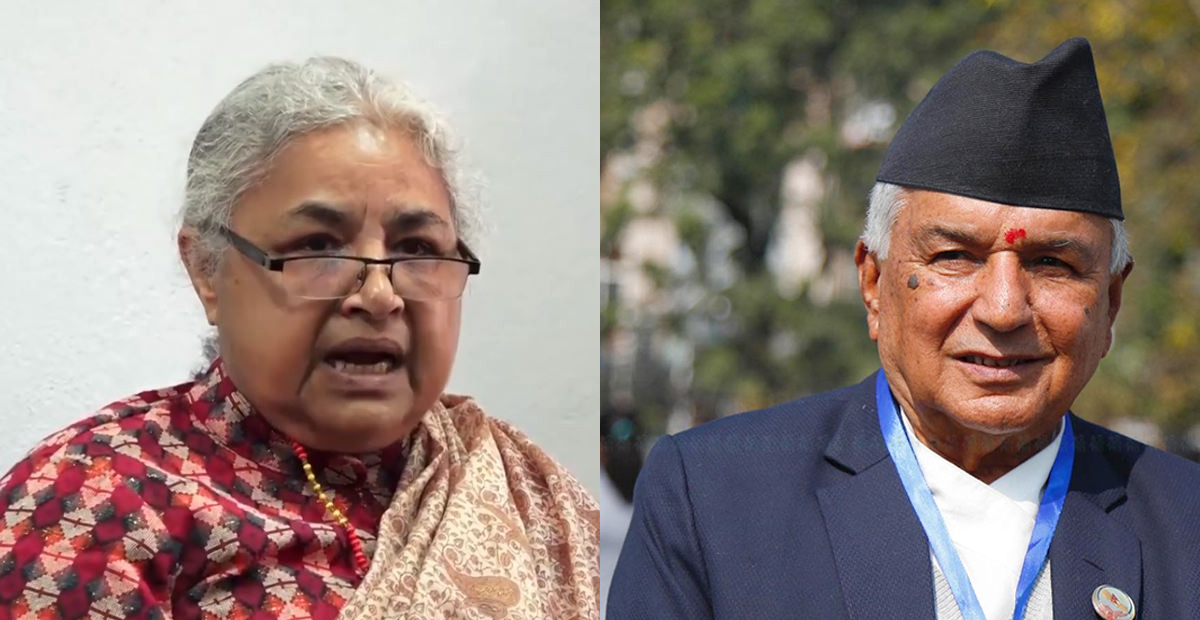President Ram Chandra Paudel and former chief justice Sushila Karki, proposed by Gen Z for prime minister, have been unable to agree on whose recommendation should be used to dissolve Parliament, leading to a delay in the appointment of the prime minister.
President Paudel has already told former chief justice Karki, "I will appoint you as prime minister." He has asked Karki to dissolve Parliament and decide on the election date through the very first Cabinet meeting after becoming prime minister.
President Paudel has told Karki that he would approve the Cabinet’s decision and that he has already secured the agreement of top leaders from various political parties to create a conducive environment for it.
President Paudel has discussed with top leaders of various parties and convinced them that Karki need not be elected to Parliament and that he will appoint her as prime minister under Article 61(4) of the Constitution.
Article 61 (4) of the Constitution states that the main duty of the president shall be to abide by and protect the Constitution.
The president is preparing to appoint Karki with wording to the effect that "the president has appointed Karki as prime minister in his capacity as the upholder and protector of the Constitution." The president has indicated that the parties are also in agreement on this.
"Even though this will stain the Constitution significantly, I have discussed it with the parties and persuaded them," President Paudel told Karki.
However, former chief justice Karki has insisted to the president that Parliament must be dissolved first. "First, you dissolve Parliament, and only then will I become prime minister," Karki told the president.
President Paudel explained to Karki that, according to the Constitution, the president can dissolve Parliament only upon the recommendation of the prime minister.
"If I dissolve it upon the recommendation of the prime minister, only then will it gain legitimacy. If the president dissolves Parliament on his own, the Supreme Court could overturn that decision in the future," President Paudel said.
Moreover, the president stated, "I am someone who believes Parliament should not be dissolved. Even when former president Bidya Devi Bhandari dissolved Parliament upon the recommendation of the then prime minister, I had said it should not be done. I have advocated for Parliament throughout my life and do not wish to bear the stigma of dissolving it. Politically and constitutionally, the president cannot dissolve Parliament."
However, as Karki has not agreed to this, the appointment of the prime minister has been delayed.
It has largely been finalized what Karki will do upon becoming prime minister.
The main task of the new government will be to conduct elections. Additionally, the government led by Karki will move forward with investigating the incidents during the Gen Z protests on September 8 and 9, as well as probing corruption and the assets of leaders.
On Thursday night, President Paudel also held discussions on this matter with Chief of Army Staff Ashok Raj Sigdel and former chief justice Karki. Prior to that, President Paudel had met with some top leaders of major parties and spoken to others over the phone.
Initially, the parties had demanded that the new prime minister be appointed from among the current members of Parliament. However, after the army and the president stated that this was not possible, they withdrew their demand. They then demanded that a representative of Gen Z be made a member of Parliament and then appointed prime minister.
On Thursday evening, the president persuaded the parties, explaining that he could not do that either and was instead moving to directly appoint Sushila Karki as prime minister.
For the past few days, the Nepal Army has been deployed on the streets for security. Security agencies are operating under the army's command.
Chief of Army Staff Sigdel has also urged the president to appoint a prime minister soon, stating that "without a decision and authority, the army cannot be deployed on the streets for an extended period."
The government led by KP Sharma Oli fell after Gen Z protested with agendas including investigation of corruption and lifting of the ban on social media platforms. On September 9, Oli resigned from the post of prime minister.

